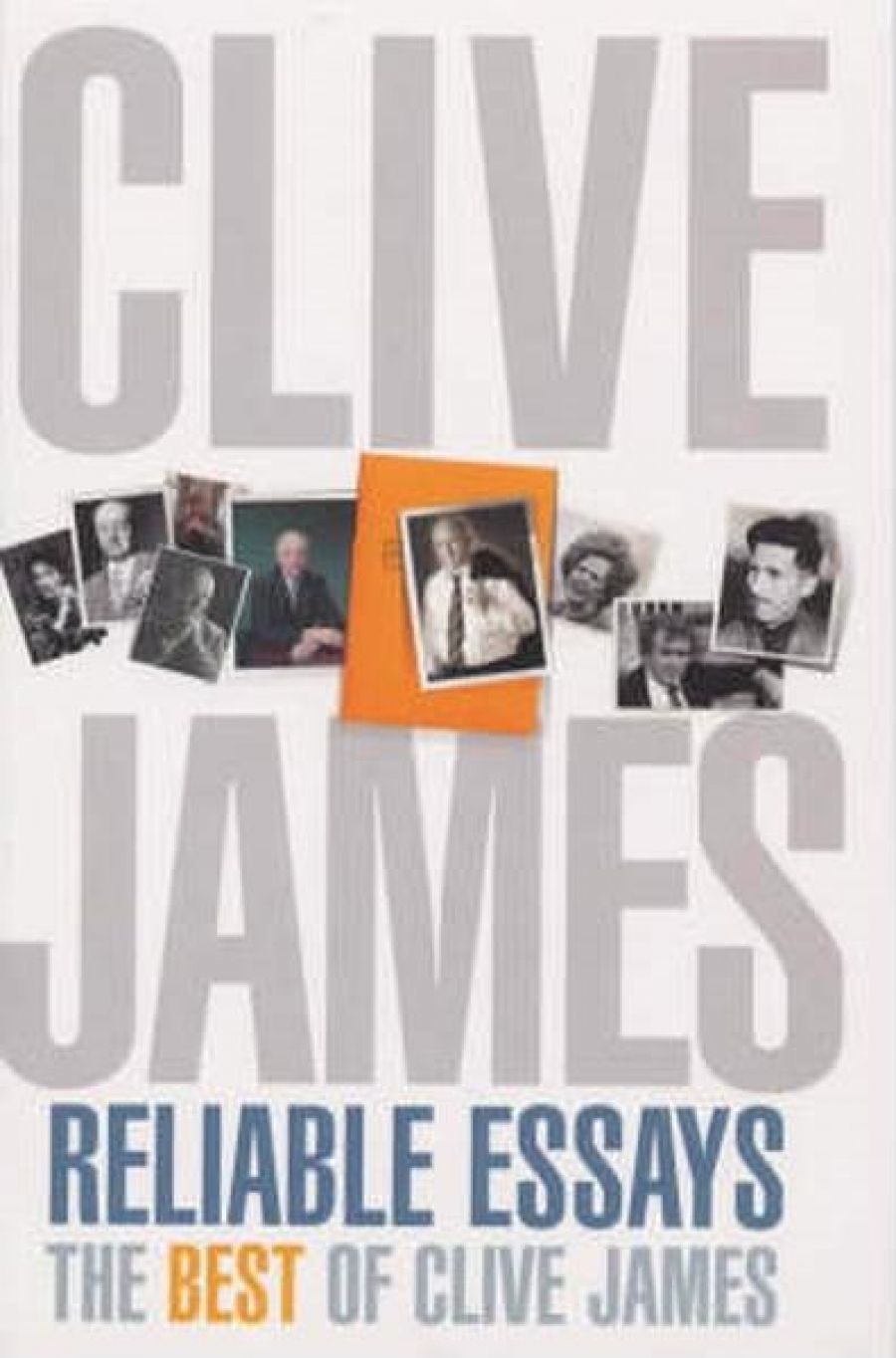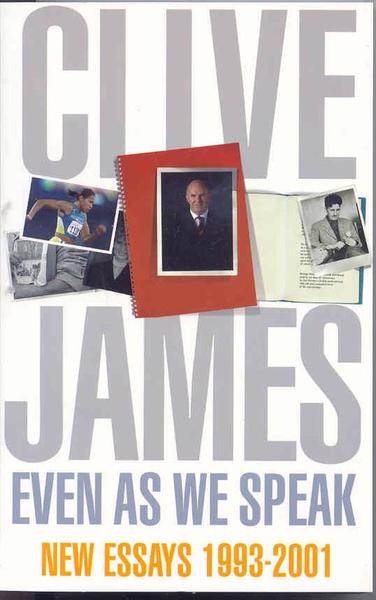
- Free Article: No
- Contents Category: Essay Collection
- Custom Article Title: Don Anderson reviews 'Reliable Essays: The best of Clive James' and 'Even As We Speak: New essays 1993–2001' by Clive James
- Review Article: Yes
- Online Only: No
- Custom Highlight Text:
Clive James needs no introduction, though he asked Julian Barnes to provide one for Reliable Essays, a selection from three decades of James’s literary journalism made by his publisher, Peter Straus. The Kid from Kogarah is, as The New Yorker once famously observed, ‘a brilliant bunch of guys’ ...
- Book 1 Title: Reliable Essays
- Book 1 Subtitle: The best of Clive James
- Book 1 Biblio: Picador, $45 hb, 349 pp, 0330481290
- Book 2 Title: Even As We Speak
- Book 2 Subtitle: New essays 1993–2001
- Book 2 Biblio: Picador, $26 pb, 381 pp, 0330481762
- Book 2 Cover Small (400 x 600):

- Book 2 Cover (800 x 1200):

- Book 2 Cover Path (no longer required): images/ABR_Digitising_2019/June-July/Even_as_We_Speak_cover.jpg
That pursuit, as James acknowledges, never ends. In his own introduction to Even As We Speak, James observes: ‘The role of the freelance man of letters (the personage on whom I so blithely conferred the title of Metropolitan Critic) is to accept – and to act on the acceptance – that he is engaged in a perpetual discussion, an interminable exchange of views in which he cannot, and should not, prevail.’ This is rather different from Dr Johnson’s ‘talking for victory’, but it is a welcome pre-emptive defence of this present piece of writing, this review of two collections of what are often reviews.
Julian Barnes takes up this theme, and can’t resist buying into the Town versus Gown, Grub Street versus the Ivory Tower, never-ending sniping story:
You are, in your own phrase, a metropolitan critic; a Grubstreeter, a passionate amateur, a full-time dilettante. Academe and Grub Street frequently affect to despise one another, and sometimes actually do … A character in a novel some years ago described academics as merely ‘reviewers delivering their copy a hundred years late’. This is no longer the case: nowadays they’re jostling the freelancers out of the weekly literary pages.
It ought to be said that Clive James has profited from two university educations, one at the University of Sydney (see his reminiscence of the late Professor George Russell – ‘a great teacher and I was the worst student he ever had’ – in Even As We Speak) and one at Cambridge. James may be an autodidact in the very best sense of that often-pejorative word, but his billycart did, as he acknowledges, receive some hefty and helpful push-starts.
James wears his scholarship lightly, but it is always there, a solid substratum. Consider, for example, his essays on Edmund Wilson’s poetry, on Eugenio Montale’s essays, on Charles Johnston’s poetry and his Pushkin, on the twenty-volume George Orwell (though it appears to have escaped his eagle eye that Orwell’s Herculean editor, Peter Davison, was once a member of the English Department at the University of Sydney, James’s alma mater dolorosa, though he may have joined the department just after James left for London; Davison, too, was a great teacher), on Pasolini and on Fellini. Himself a great comic poet – consider ‘The Book of My Enemy Has Been Remaindered’, a poem that performs the apparently impossible task of living up to its title – James writes about poetry as an insider and, where a certain type of academic or academic discourse would break poetry’s butterfly upon a wheel, he writes with an insider’s sympathy and authority. He does so even when the task seems impossible, if not self-contradictory, saying of Larkin that his poetry was, ‘and will remain, too self-explanatory to require much commentary’. That does not prevent him writing four splendid essays on Larkin, and one on Andrew Motion’s Larkin. If it be James and not some mute, inglorious editor who is responsible for the title ‘Don Juan in Hull’, then that is an achievement all its own.
James is, it goes without saying, a very funny man. Consider his ‘Mrs T in China’, in which Mrs Thatcher goes mano a mano with Zhao Ziyang, ‘the man whose name sounds like a ricochet in a canyon’. You can hear the familiar rhetorical flowers of Clive James, the television voice. It may be significant that ‘The Dragon Lady Flies East’, the first of two essays about Mrs T in China, was phoned in from Beijing to London. The medium is the message, or is that message-stick? But, and it is a significant but, that recognisable James clowning is virtually absent from his serious pieces. It’s not so much a case of Dr Jekyll and Mr Hyde as of a man who fully understands generic propriety, and is able to keep himself in check. And, speaking of cheques, let he who is without sin cast the first stone, and let no man who has a mortgage feel superior to James for being, as Mark Twain might have said, a clown with a college education. If the monies from the television shows have kept the bank manager at bay, sent the kids to school, and liberated James to learn Russian, polish his Italian, fine-tune his German (who else in literary journalism gives the German title of Walter Benjamin’s ‘Work of Art in an Age of Mechanical Reproduction’? James has a point to make about this Englishing), and to have provoked the virtuous envy of Peter Conrad for his encyclopedic reading, then who is pure enough to deny James his fame as ‘TV’s Clive’?
These collections are challengingly various: from the sublime to the ridiculous and back again. In addition to authors and topics already mentioned, we may find Les A. Murray, Barry Humphries, Germaine Greer, Princess Diana, Torvill and Dean, the Sydney Olympics (‘nothing succeeds like excess’), Australia from Abroad, totalitarian tabloids, Nabokov, Waugh, and wars (Anzac Day), and many, many more. There is much to disagree with (‘perpetual discussion’), much to cherish. What is to be cherished most of all, perhaps, is the energy, which shows no sign of flagging, the sheer interest in words and the world. That which James salutes in others may perhaps be used as a litmus test for his own work.
Montale’s ‘is critical prose of the best type: highly intelligent without making mysteries, wide-ranging without lapses into eclecticism or displays of pointless erudition, hard-bitten yet receptive, colloquial yet compressed’. (James acknowledges, twenty years after the original review, that Montale farmed out reviews of English language books while publishing the reviews in his own name.) James is able to resist ‘pointless erudition’, referring to the ‘next to last’ poem of Larkin’s High Windows rather than the ‘penultimate poem’, thus resisting a too-easy alliteration.
Of Wilson: ‘The fearless gusto of his approach still seems to me the finest example in modern times of what a critic should have by nature, the quality that the mighty philologist Menendez Pidal called a spontaneous yearning after the totality of knowledge.’ There was, it might be added, nothing spontaneous about Mr Casaubon’s quest for a ‘key to all mythologies’. James is not concerned that Wilson never ‘got around’ to reading Middlemarch, though he does chide him for not bothering to learn Spanish (as opposed to, say, Hungarian).
Of Larkin’s All What Jazz: ‘Against intellectualism he proposes, not anti-intellectualism – which would be just another coldly willed programme – but trust in the validity of emotion … A critic’s language is not incidental to him: its intensity is a sure measure of his engagement and a persuasive hint at the importance of what he engages with.’
Of Larkin’s ‘An Arundel Tomb’: ‘There is a level of seriousness which only those capable of humour can reach.’ James finds something of the same in Montale’s ‘seriatà scherzevole, a joking seriousness, a humane ease whose steady claim on your attention reminds you that he is the opposite of dispassionate. He is a passionate man in control of himself, having seen, or guessed in advance, what self-indulgence leads to.’ Such joking seriousness or serious joking informs some of James’s finest hommages, which often take the form of pastiche: consider his version of Larkin in ‘The North Window’, his virtuoso tribute to Ian Hamilton, his bons mots (‘Pasolini loved stardom, which for a champion of the common man is always bound to present a contradiction’; the Jindyworobaks gave the general impression ‘of petty larceny masquerading as ethnology, like André Malraux swiping statuettes from pagodas’).
James pulls no punches. He wants attentive readers. ‘To believe Larkin really meant that “Books are a load of crap” you yourself have to believe that books are a load of crap. The arts pages are nowadays stiff with people who do believe that, even if they think they believe otherwise.’ This broadside against Grub Street might also be aimed at the Academy. Who has not heard of the professor who, having convinced his students that there were no ‘great’ books, was embarking upon convincing them that there were no ‘good’ ones? We live in the age of the Sociology of the Imagination. I myself am in a post-Theory phase, and applaud Clive James on being too smart ever to be a part of the postmodern Laputan academy.


Comments powered by CComment